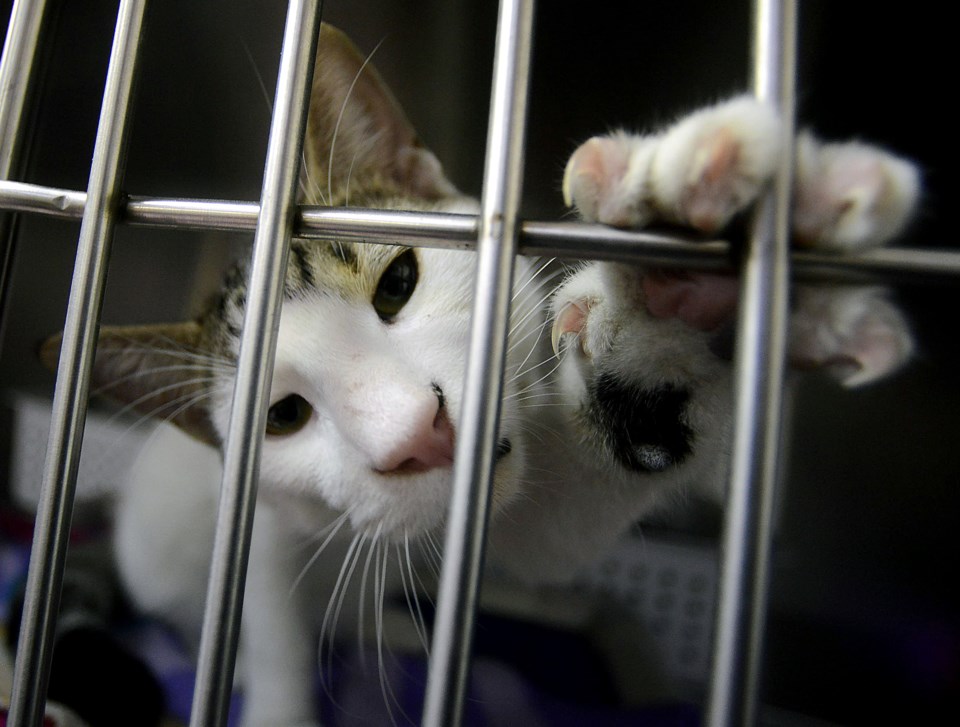Cat owners will be required by law to purchase a license for their furry companions as of Jan. 1, but that doesn’t mean the cat-catcher will come knocking.
“Bylaw staff will not be proactively enforcing the cat license, however, any cat that’s picked up by the Guelph Humane Society without a license will be required to obtain one at that time,” said David Wiedrick, the city’s bylaw compliance manager.
The Guelph Humane Society hopes the new measure will increase the odds of stray cats reuniting with their owners. In 2017, over 800 cats were brought into the shelter but only 19 per cent, or 152 cats, were returned home. By comparison, approximately 80-85 per cent of dogs were returned.
“We really want to see an increase in the cats in our community that are identified so when they are coming in as strays we have that opportunity to contact their owner quickly and reunite them with their family,” said Lisa Veit, Associate Director of the Guelph Humane Society.
Veit said that although non-compliance with the bylaw does carry a fine, it would be rare for fines to be laid.
“We put the emphasis on education and getting pets licensed. We don’t issue fines, that is to say, it would be a very unusual circumstance,” she said.
The new licensing program is administered by the Kingston-based company DocuPet. It will allow for community members to search a license number through the company’s website to connect with the owner of a stray pet.
“Only veterinary clinics and animal shelters have the microchip readers that can read a microchip and access the database to trace that back to the owner. Visible identification is visible to anyone who comes across the cat and they would have the means, if they have a concern about the cat, to contact the owner,” said Veit.
Cat licensing was recommended to the city by the Animal Control Working Group and approved by council in 2016. Cat licensing was voluntary in 2017.
But some residents say there has been a lack of transparency from the city surrounding allocation of funds generated from the license.
“It’s like putting the cart before the horse...they’re getting all of this money and they don’t even know where it’s going,” said Jordan Willis, administrator for the Facebook group, Cats of Guelph.
Willis said he received vague answers from the city when he inquired about how the license fee would be spent and how the bylaw would be enforced.
“They haven’t communicated with the pet owners,” he said.
Willis was made aware of the bylaw in November after one member of the Facebook group posted a photo of a door knocker left at their home. The knocker stated that an unlicensed pet had been identified on the premises.
“The first notice you’re going to have of this bylaw is some notice hanging on your door in a threatening manner,” he said.
DocuPet says that it has left 6,000 doorknockers since it began it’s Guelph campaign in November. The company estimates that there are approximately 32,000 cats owned in Guelph.
According to Wiedrick, $20 of the $25 licensing fee will go toward offsetting the operating costs for the Guelph Humane Society which comes out of the city’s budget.
Included among operating costs for the Humane Society are building, staffing, food and vet costs. Currently, revenue comes from dog licensing.
The city said they will offer a subsidy on a case-by-case basis for those who find the licensing fee to be a barrier. Subsidy information can be attained through the GHS or by calling the bylaw office.
Purchase of a license also comes with a $25 voucher for Ren’s Pets Depot.
The remaining $5 from the fee will go toward a cat welfare fund. The city has said that the cat welfare initiative will focus on education but that specifics of the initiative will be determined by the Animal Control Working Group in the new year.
